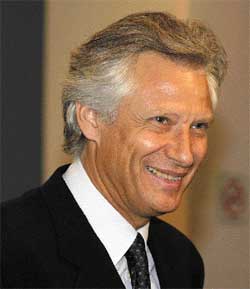
18/03/2006 - 26/03/2006
In a nutshell, Lisbon is a great city. We stayed with high school friend M and his girlfriend J (both expert guides, immesurably enhancing our visit) in an appartment with a view on a bridge that looks like San Francisco's Golden Gate Bridge and the Christo Rei, a replica of Rio de Janeiro's massive Jesus Christ statue. An uncharacteristically derivative view for a city of such character.
Lisbon's "old" centre is fairly big and, most importantly, integrated (unlike fragmented Brussels). Apart from the flat, rectangular grid of the Baixa quarter, Lisbon is a hilly and endless daedalum of narrow, winding, photogenic, cobblestone streets lined with pastel-coloured or azulejo-tiled houses in various states of disrepair with old women leaning out of first floor windows, surveilling their corner of the world.
A longtime inhabitant complained to us that the city was totally impractical: the "Portuguese stone" sidewalks (small white cobblestone, sometimes with elaborate patterns of black stone) are very slippery when wet, prey on high heels and tiring to walk, most houses are draughty and somewhat humid, etc. True, but all these impracticalities are what make you love the city in the first place. Anywhere best described as "really practical" is likely to slip from memory once exited. Here, some streets are so steep that they have a tram line dedicated to them alone, called elevators. There are modern trams in the flatter sections with wider streets, but otherwise, they are old fashioned, wooden vehicles with very narrow wheel bases that shake and creak and look like a can of Coke or Carlsberg (depending on the tram's sponsor) on its side.
Another notable Portuguese institution is the pastelaria, or bakery. They serve both salty and sweet pastry, such as pasteis de nata (cream-filled tartelettes, the pastelaria de Belém is reputed to have the best, retitled pasteis de Belém for the occasion. IVN and M were convinced, I, less so) that you sprinkle with cinnamon, bolos de arroz, which are sort of like big madeleines, meat pasties, orange-flavoured tartelettes and all kinds of cakes. At any pasteleria worth its salt you can sit down to eat, but you can also stand at the counter, which is rather impractical (that word again) for anyone behind you trying to order. You can also smoke in there, the mix of cigarette smoke and fresh bread was a new and unsettling smell to me.
One could go on about the views, the parks, the multitude of cool bars in the Bairro Alto, the community feel of the Alfama neighbourhood, the transversal stairs, the Soviet-era-sized line to get into a Womens' Secret store that was offering a one-day 40% off special, the crazy amalgamation of functions and architectural styles found in the Alentejo Regional Cultural Centre, "The Temptations of Saint Anthony" (totally mind-blowing, in itself worth a trip out to the Museu Nacional de Arte Antigua) and so on and so forth. But I'll leave it to you to discover it for yourself, or follow along as I post photos in upcoming posts.





